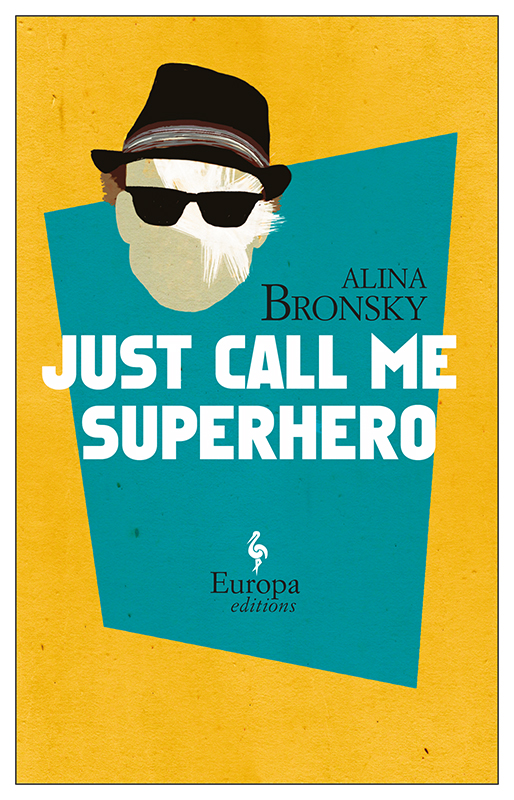
Just Call Me Superhero
کتاب های مرتبط
- اطلاعات
- نقد و بررسی
- دیدگاه کاربران
نقد و بررسی

November 10, 2014
The latest novel from Bronsky (The Hottest Dishes of the Tartar Cuisine) sets out to be a "cruel comic romp," filled with caustic, eccentric folk and ending in a kind of redemption. The main character, a 17-year-old boy named Marek maimed and disfigured after an attack by a Rottweiler, is as corrosive as acid. One day Marek's cold mother, Claudia, tricks him into going to a support group "for cripples." The others in the group, one blind, another in a wheelchair, all afflicted in some way but distinguishable on the page only by their disabilities, come together under the direction of "the guru" who decides to make a film about them. Marek falls for the beautiful Janne, who is in a wheelchair, and is also being pursued by the blind Marlon. The novel takes an abrupt turn when Marek's father dies, and Marek must leave the group to attend the funeral. He meets his young step-brother, whose mother was Marek's au pair and for whom Marek's father left Claudia. The two story lines have little in common, and the resolution at the end of the book is not at all believable, having to do with the identities of the guru and each of the young people in the group. Bronsky's novel strives for absurdist humor but falls short.

August 15, 2014
A German teen learns the importance of friendship, family and forgiveness in Bronsky's third novel (The Hottest Dishes of the Tartar Cuisine, 2011, etc.). After Marek is attacked by a Rottweiler, his disfigured face isn't the only thing giving pain to the formerly handsome teenager. Enrolled in a small "cripple" support group by his divorced mother, Claudia, Marek idles between disgust and contempt for his fellow group members, his mother, and society at large. The six-person group is led by a seemingly unscathed "guru" whose unusual practices, including encouraging the group to film each other for a documentary, cloak a secret. Then Marek receives news that his father, who remarried and fathered a young boy, has died in a mountain-climbing accident; the boy's journey to bury his father and spend time with his half brother and stepmother allows him to come at last to the core of his own humanity. There are no draggy sections thanks to the book's nimble pacing and funny, vivid imagery ("The guru closed his eyes. Then he opened them again and exhaled slowly, like a boy who has just accidentally climbed up to the ten-meter diving platform"). Bronsky's organic revelations, which often take place in the middle of a phone conversation or in the observation of a quiet moment, propel the story forward while catching the reader off guard. Although Marek is narrating, the reader gleans his true character from the flinches, winces and face punches he elicits from those around him. By exploring what happens when one's public face is literally gone, Bronsky thoughtfully asks what constitutes one's fundamental identity. The answer to this question informs the book's title: We are ultimately defined by the people in our lives and how we show our love for them.Bronsky's warmth, humor and sharp observational eye combine to make this coming-of-age tale a rich, affecting read.
COPYRIGHT(2014) Kirkus Reviews, ALL RIGHTS RESERVED.

October 15, 2014
Set in Berlin, Bronsky's third novel (after the acclaimed Broken Glass Park and The Hottest Dishes of the Tartar Cuisine) features the formerly handsome Marek, a teen whose face was terribly disfigured by a Rottweiler. In the year since that event, Marek has hidden himself away. In order to get him moving, his divorced mother tricks him into going to a support group for young people with a variety of serious challenges, led by a mysterious "guru." Marek is at first contemptuous, though he is drawn to the beautiful, wheelchair-bound Janne. Just as the group begins forming an interesting bond by going on a trip together, Marek is called away by a family crisis. The unlikely combination of the support group and the crisis serves to pull the young man out of his grief and anger, as he journeys toward acceptance of his sacrifice, his situation, and his heroism. VERDICT Bronsky presents strong characterizations while slowly unveiling plot twists and providing an enigmatic conclusion that hints at the mystical. This well-written novel could work as an adult/YA crossover. [See Prepub Alert, 8/11/14.]--Susanne Wells, Indianapolis P.L.
Copyright 2014 Library Journal, LLC Used with permission.

October 1, 2014
Badly disfigured by a rottweiler attack, 17-year-old Marek is tricked by his lawyer mother into attending a support-group meeting, where he immediately falls in love with the beautiful but wheelchair-bound Janne. Reluctantly he joins the group, which he acidly calls a bunch of cripples and headcases, and agrees, with the others, to be filmed for a documentary that the group leader, whom the young people call the Guru, is doing. Continuing filming, the man then takes the group on a retreat that, he promises, will change their lives. Marek's life is, indeed, changed, though not necessarily by the group retreat, but rather by the unexpected death of his estranged father; at this point, the novel essentially becomes two stories that will intersect at the end but not before readers recognize that the totally self-absorbed Marek is an exercise in solipsistic Weltschmerz (yes, the story is set in Germany). German author Bronsky has written an unusual coming-of-age novel about a boy whose disaffection is reflected in his damaged features but who ultimately comes to terms with both his exterior and interior disfigurements.(Reprinted with permission of Booklist, copyright 2014, American Library Association.)

























دیدگاه کاربران